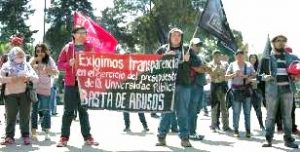Mexico City, February 14—In our latest ICWP study group we had decided to read “The State and the Revolution” by Lenin.
The majority of the young people study at the Metropolitan Autonomous University. We started by discussing the strike of workers there who are demanding a pay increase.
“We are the only ones who support the strike in our class,” commented Sol. Students commented on the pro- and anti-working-class Facebook comments about the strike.
“Then you must convince more fellow students to support the workers,” answered Comrade Armando, a teacher and member of the Party for many years.
Armando said that he participated in a demonstration a few days ago with his fellow teachers at the institution where he works. “Everyone gave very militant speeches, but nobody talked about revolution. I said that the workers should re-take up the revolutionary perspective, that we should aspire to much more.”
Nadia asked how wages would be paid in communism. Atilio, a young member of the Party, answered that the elimination of wage slavery meant that we will all have our basic needs met without having to be forced to sell our labor power. He said that we would work understanding that our labor is needed for the society, and not for a wage.
“What makes our line different from the rest of the communist parties, is that we fight for the immediate elimination of wage slavery,” added Armando.
Talking about the strike, Nadia said that capitalist education is a business, that only those who have enough money can afford a career.
We decided to discuss the ICWP Communist Education pamphlet next. Self-critically, we could have mentioned the work of our comrades in the recent teachers’ strike in Los Angeles.
Next we talked about the main ideas of “The State and the Revolution,” which we had all read as agreed. We mentioned that the existence of the State is a sign of the irreconcilable character of the contradictions between the classes. This has not always existed and at some moment, when there are no longer classes, it should disappear.
Nadia asked if there was any way to make the revolution peacefully.
Sol replied, “No. We do not want to enter into wars, but no ruling class has peacefully given up the power they have.”
Armando added that the working class must forcefully impose the new way of life; that we will have to defend what the revolution has achieved.
This meeting showed an advance in the understanding of communist ideas by the whole group. But the most important thing is the development of communist social relations in the collective. The confidence and friendship that young students have forged is the main engine of the group. They talk about the study group in daily conversations and are enthusiastic about meeting. They are thinking of integrating another friend into the meetings. One of them could not attend because of health problems, but she sent a text the next day asking if someone could meet with her so she could catch up on what was discussed.
“I haven’t told my friends that I am in this study group, but I ask them what they think about Communism. Some have a negative opinion, but that is because they don’t know what it really is. Being in this group has motivated me to continue learning more about what Communism is,” said Nadia, concluding the meeting.

Strike at Metropolitan Autonomous University in Mexico City. “We demand budget transparency in the public university. No more abuses!


